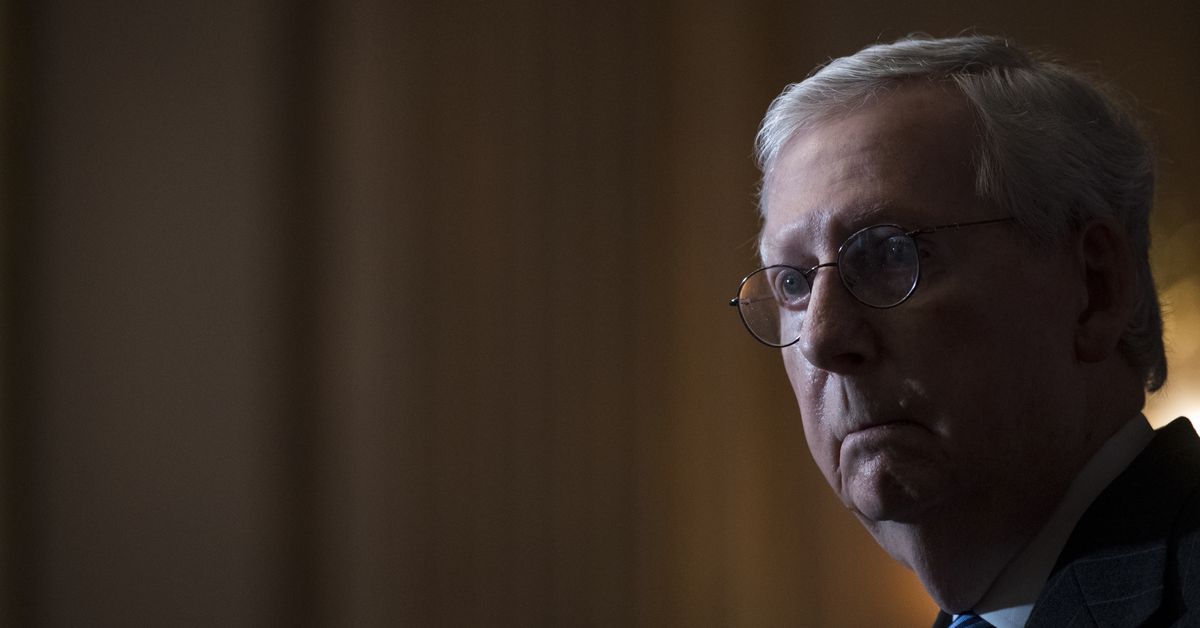
On Tuesday night, McConnell introduced a new bill tying increased stimulus payments to a full repeal of Section 230, according to bill text obtained by The Verge. The bill comes amid new momentum for direct $2000 stimulus payments, and increasing pressure on party leaders to appease President Trump’s escalating demands.
Democratic party leaders criticized the inclusion of Section 230 repeal as an effort to scuttle stimulus talks. “Senator McConnell knows how to make $2,000 survival checks reality and he knows how to kill them,” Senate Minority Leader Chuck Schumer (D-NY) said in a statement Tuesday. “Will Senate Republicans go along with Sen. McConnell’s cynical gambit or will they push him to give a vote on the standalone [bill]?”
Aimed at the full repeal of section 230:
McConnell’s bid for a full repeal of Section 230 comes amid increasingly chaotic negotiating over the level of direct payments to be included as part of stimulus efforts. On Sunday, President Trump signed into law Congress’ $900 billion COVID-19 relief and government spending package that would provide $600 in stimulus payments to most Americans. In a public statement after signing the bill, Trump urged congressional leaders to hold a standalone vote on increasing direct payments to $2,000.
By Tuesday morning, many Republicans who previously opposed the increased stimulus checks flipped to support of them alongside Democrats. In particular, both Georgia Senate runoff incumbents, Sens. David Perdue and Kelly Loeffler (R-GA), announced Tuesday that they would vote to approve the additional payments after days of sidestepping the question, creating a difficult position for McConnell.
Sen. Josh Hawley (R-MO) said in a tweet Tuesday that the Senate has “got the votes” to approve the increased payments. But later that day, McConnell blocked a House bill that would provide $2,000 in stimulus payments to most Americans, citing the need to tackle higher payments alongside other issues raised by President Trump.
In a floor statement made Tuesday, Senate majority leader Mitch McConnell (R-KY) linked a handful of unrelated policy measures to the future of the increased stimulus checks; amongst them, Section 230 of the Communications Decency Act, a law that shields tech companies like Facebook and Google from legal liability over the content users post on their platforms.
“During this process, the president highlighted three additional issues of national significance he would like to see Congress tackle together,” McConnell said Tuesday afternoon. “This week, the Senate will begin a process to bring these three priorities into focus.”
Even before the bill was introduced, some lawmakers feared the majority leader would use Section 230 as a poison pill to doom the broader package.
“That is an invitation for this entire effort to fall apart,” Sen. Chris Murphy (D-CT) said on the Senate floor Tuesday.
In recent months, Trump has often used Section 230 as a negotiating tool to push forward other policy priorities or tie up unwanted legislation. Last week, Trump vetoed the $740 billion National Defense Authorization Act (or NDAA), after complaints that the defence bill did not include a provision that would repeal Section 230. Sen. Bernie Sanders (I-VT) threatened Tuesday to block a Senate vote to override Trump’s NDAA veto if McConnell did not agree to open a standalone vote on $2,000 checks.
“Big Tech must not get protections of Section 230!” Trump said in a statement Sunday. “Voter fraud must be fixed!”
Updated 12/29/20 at 5:28 PM ET: A previous version of this article was published at 2:33 PM ET under the headline “Section 230 has become a bargaining chip in ongoing stimulus talks.” The article was updated to its current form, including a new headline and timestamp, when full bill text became available.


